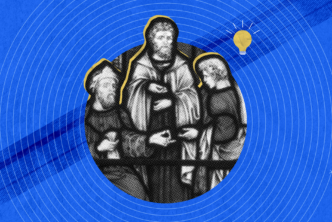Given that only two angels are explicitly named in Scripture (Michael and Gabriel), it is unsurprising that they have garnered a lot of attention, speculation, and reverence throughout the centuries—in both religious tradition and popular media.
Some even believe Michael was the pre-incarnate Jesus.
With the help of Dr. Michael Heiser’s Angels, we will consider archangels in the Bible, like Michael—and some other important angels you might not be aware of.
Archangels in the Bible
Michael is identified as “one of the chief princes” (Dan 10:13).
Technically, only Michael is called an archangel in the Bible (Jude 1:9). Our identification of Gabriel as an archangel is due to non-canonical Second Temple Jewish literature. First Enoch also names additional archangels, like Raphael and Phanuel. Jewish texts like 1 Enoch associated “archangels” with the more numerous “sons of God” and “watchers.”
The number of archangels in these texts is not certain, ranging from four to seven. If this view is correct, then archangels are the high-level sons of God and “princes” in Daniel who were assigned oversight of the nations. There was much speculation in the Second Temple period about these angels, their ranks, and achievements.
In both Daniel (Dan 8:16, 9:21) and Luke (Luke 1:19, 26), Gabriel functions as an interpreter and messenger to Daniel and Mary.
Contrary to popular belief, Michael is not identified as the commander of Yahweh’s army. Rather, he is “the great prince who has charge of your people [Israel]” (Dan 12:1). In other words, Michael is a special guardian over Israel, much like the other divine “princes” that ruled over other nations (Dan 10:13; Ps 82; Deut 32:8–9).
The angel of Yahweh
“The angel of the Lord” is the most referenced angel in the Bible. According to Heiser, “this figure is actually Yahweh himself in the visible form of a man” (p. 57).
This can be seen when one understands the importance that Yahweh’s “name is in him” (Ex 23:20–22). Yahweh’s name is his very identity (Isa 30:27–28; Ps 20:1), “another way of referring to himself” (p. 60).
Some think that the angel of the Lord is merely Yahweh’s representative, but the connection is closer (e.g. Gen 31:11–13; 48:14–16; Hos 12:3–4). This angel is the same as Yahweh and yet different, suggesting that he is, in fact, the second person of the Trinity, the eternal Son of God who would take on flesh as Jesus of Nazareth.
The commander of Yahweh’s army
An individual identified as the commander of Yahweh’s army appeared to Joshua before the conquest began:
When Joshua was by Jericho, he lifted up his eyes and looked, and behold, a man was standing before him with his drawn sword in his hand. And Joshua went to him and said to him, “Are you for us, or for our adversaries?” And he said, “No; but I am the commander of the army of the Lord. Now I have come.” And Joshua fell on his face to the earth and worshiped and said to him, “What does my lord say to his servant?” And the commander of the Lord army said to Joshua, “Take off your sandals from your feet, for the place where you are standing is holy.” And Joshua did so (Josh 5:13–15)
Note that this individual was not the angel “of Israel” or “of Israel’s army.” Rather, he was the angel of Yahweh’s army. This passage recalls Moses’ encounter with the angel of Yahweh in the burning bush (Exod 3:2; Acts 7:30–31).
This indicates the commander of Yahweh’s army is one and the same with his angel, the visible embodiment of Yahweh himself. That is, the commander of Yahweh’s army is synonymous with the angel of the Lord.
‘The prince of the host’
An enigmatic figure in Daniel is the “prince of the host” (Dan 8:11). He, too, is one and the same as the commander of Yahweh’s army seen in Joshua 5:14, a manifestation of Yahweh himself.
But what about the belief that this prince is Michael? That is unlikely. There are several passages that refer to a “man” distinct from Gabriel and Michael and apparently superior to them (see Dan 8:15–26; 10:4–21). In Angels, Heiser suggests that this is the prince of the host of Daniel 8:11. This makes sense, since he commands angels, as is expected of one named the “prince of the host” (Dan 8:11).
As Heiser concludes, “Daniel 8:11 suggests that there is a ‘prince’ over the entire host. In addition, Daniel 8:25 refers to a ‘prince of princes.’ Michael is but one of the chief princes, and so he cannot be the prince that is over all the other princes” (p. 72).
Conclusion
So who are the different princes? The biblical data suggests that Michael is the sole figure identified as an archangel in the Bible, Gabriel is an important messenger to Daniel and Mary, and the angel of the Lord, commander of Yahweh’s army, and prince of the host are synonymous and refer to God himself manifested in physical form.
Learn more in Dr. Heiser’s book Angels.
***







